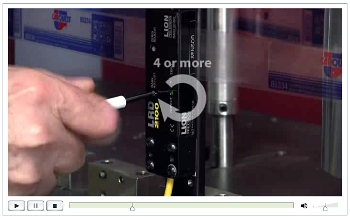Users of Lion Precision’s LRD model clear label sensors now have a new resource for learning the best and easiest way to adjust the sensors.
 LRD Videos Image
LRD Videos Image
“The sensors are specifically designed for easy setup, and many users are making unnecessary adjustments when changing labels” says Mark Kretschmar, Lion Precision communication manager. He adds that the adjustment process has been made considerably easier in recent years, but that long-time users have no reason to re-read the manuals for a sensor with which they are already familiar. “That’s the reason for the videos. Most people don’t read manuals anymore, but they will watch a minute-and-a-half video.”
The company’s three primary sensor models, the LRD8200, LRD6110, and LRD2100 each have a setup video that only lasts about 90 seconds. Lion Precision is in the midst of a campaign to raise awareness of the videos. Kretschmar continues, “The reason we got into the label sensor business was to solve the clear label problem and make people’s lives a little easier. We can continue in that tradition if we get the users of over 50,000 sensors to watch the videos and learn the simple procedures.”
One sensor, the LRD2100, has an adjustment that is only meant to be used when the sensor is first put on a machine, but many users unnecessarily adjust it multiple times a day. The sensor comes with small adhesive dots intended to put over the adjustment after its initial setting to prevent further adjustment, but few people use the dots. It is this sort of misunderstanding the company hopes to remedy with the video campaign.
Links to the videos can found on the main product page for each sensor at http://www.lionprecision.com/label.
In 1995, Lion Precision created the world’s first and only “capacitive” label sensor – a new technology that worked equally well on clear labels. This new sensor, the LRD2100, eliminated the costly practice of printing “eye-marks” on label webs and revolutionized the packaging industry. Newer models have since been released, the newest of which, the LRD8200, uses ultrasonic technology.
A selection guide and comparison of label sensor technologies can be found at http://www.labelsensors.com.
Lion Precision started in 1958 as the first provider of capacitive displacement sensors to industry. The company has expanded its product offering to include eddy-current displacement sensors and some application specific sensors for the machine tool, packaging and PCB industries. The company is focused on assisting users in sensor implementation by providing technical knowledge resources, expert guidance and optimized systems including custom designs.
For more information, contact Lion Precision:
Lion Precision
563 Shoreview Park Road
St. Paul, MN 55126 USA
651-484-6544
www.lionprecision.com
[email protected]